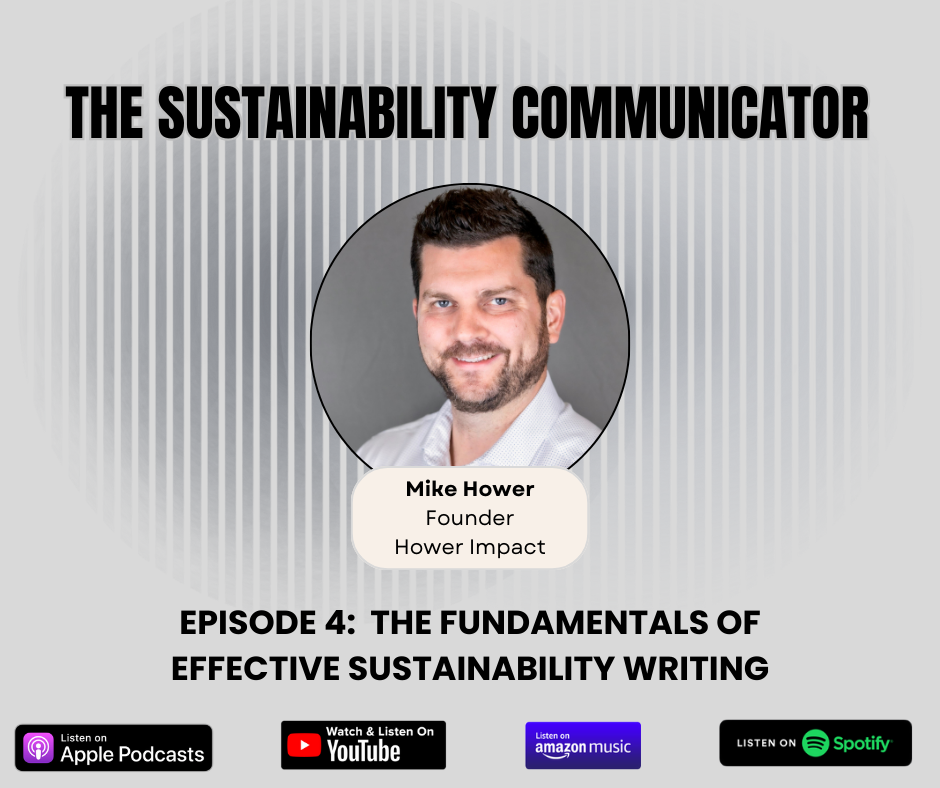Ep. 4: The fundamentals of effective sustainability writing
Writing is a lost art for many sustainability professionals. But the ability to write well continues to be critical for communicating social and environmental challenges effectively. In this episode of The Sustainability Communicator, Mike discusses key learnings from over a decade as a write and editor in the corporate sustainability space that form the fundamentals of effective sustainability writing.
Read the full transcript of the conversation below. You can also listen to this episode on Spotify, Apple Podcasts, Amazon Music and Youtube.
TRANSCRIPT
Writing is a lost art for most corporate sustainability professionals. It's time to bring it back.
Hey everybody, and welcome to the sustainability communicator — the podcast, exploring the intersection of corporate sustainability and storytelling. I'm your host, Mike Hower, a sustainability communication nerd with more than 15 years of experience on both sides of the podium — as a journalist for media outlets like GreenBiz and a communication strategist for major global companies — during each episode, we explore interesting sustainability communication, challenges, risks, and opportunities facing folks in the business community and beyond. If you're ready to talk your walk, then you've come to the right place. Time to get to it.
As a sustainability communicator, I spend a lot of time writing and thinking about writing. Whether it's writing sustainability reports, creating web copy, developing blog content or external articles for my clients. And also writing my own articles for GreenBiz, my own blog newsletter, and even on LinkedIn. I think a lot about how the written word can be used to advance social and environmental impact.
Some might think that the ability to write well is no longer needed because we have tools like ChatGBT and other forms of iterative AI that can essentially write articles for us. But I disagree. I believe that the ability to write well continues to be a critical skill for communicating sustainability. And I'll tell you why.
Strong writing skills allow sustainability professionals to achieve several objectives, including educating and engaging stakeholders in action. Persuasion is one of the most important powers that a sustainability professional cultivates throughout their careers. And writing allows us to deepen and clarify our thoughts on complex sustainability topics.
Throughout a career in corporate sustainability, you'll be required to engage in several types of writing. Many might think first and foremost about sustainability report writing, which is definitely common these days, especially as it gets more and more interest from companies around the world. But it's also important to know how to write emails, internal notes to employees, blog posts, articles that might be published externally in a news outlet and even social content is increasingly important when it comes to educating and engaging stakeholders on sustainability.
After more than a decade as a sustainability focused writer and editor, I've seen my fair share of good and bad writing — and everything in between. From covering the complexities of the climate crisis to sharing strategies for social impact, I've learned a thing or two about what does and doesn't work. While many people might think that you're born with the ability to write well — that's just not the case. Everyone can become a better writer if they put the time and effort into learning and improving. And the challenge of writing well and corporate sustainability is that it's not just about being a good writer. It's about understanding the nuances of the complex sustainability challenges that you or your organization might be facing. One day it might be about the circular economy and another day it might be about scope three emissions in the supply chain. And on another day it could be about net zero goals or diversity equity and inclusion goals.
Because I spend so much time editing and thinking about sustainability writing, I thought I'd try to help elevate sustainably writing across our industry by offering what I call the Writing for Impact Masterclass. Andwe had our first class last fall and had about a dozen sustainability professionals attend from all levels — but mostly senior folks — and it was really helpful. It seemed to engage a lot and people seemed to learn a lot. It was great to get a group of people together where we could workshop some articles that they're working on and cover some of the basics of good writing in general and also good sustainability writing.
And some of the learnings from that class or what I want to share with you today. The fundamentals of effective sustainability writing. And I think everyone — if they can learn these skills — will be better at writing and better communicating sustainability overall.
The first fundamental effective sustainability writing is “seek word efficiency.” So when writing about sustainability, less is more. Over my career so far, I've come across countless articles where the author wastes words needlessly and just talks too much about the topic without getting their point across. Just as a sustainability professional might work to reduce the number of transports needed to get a business’ goods to market, the fewer words that you use to get your point across the better.
Good writing is clear and concise. You don't want to bury the lead, as all new journalists are taught. You want to get to the point and only include the words necessary for backing up your argument. So, if writing about circularity and your company's approach, you don't need to spend several paragraphs explaining the history of plastic waste depending on your audience. Typically, you have about 10 to 20 seconds to capture the attention of a reader before they lose interest.
So don't dilly dally or your writing may go unread. And you also need to know that it's tough to achieve word efficiency in earlier drafts. So, feel free to let out all your thoughts onto the screen or a piece of paper and then when you move into editing, you can improve the word efficiency later.
The second fundamental to effective sustainability writing is “embrace originality.” Cliches run rampant in corporate sustainability communication. If you can detect a lot of cliches in a company's communications around sustainability, there's a really strong chance that they're greenwashing. Think about how many times you've read the words “empowering communities”, “building a better future” or even “going green.” A cliche is a phrase, expression, idea or element of writing that has been overused to the point where it has lost its originality and its impact or effectiveness. Cliches often become trite and predictable because they've been used so frequently that they no longer convey that freshness or creativity that they once did.
And you can avoid cliches by focusing on the substance of your story. So, rather than saying your company is going green, you might write that it's embedding social environmental factors into its business strategy. While sometimes this means using more words — which I know contradicts what I just said about word efficiency — using cliches is still not an effective shortcut, so avoid it at all costs.
The third fundamental is “be humble while avoiding hyperbole.” If you look at a lot of sustainability communication and writing out there, you might be surprised to learn that we haven't actually already solved the climate crisis and every other social environmental problem. Oftentimes, there's very fluffy language and ESG reports, blog posts, op-eds and even on LinkedIn, that makes it sound like every single company on the planet has already solved all these problems or is doing such impactful work that they can single-handedly take them on themselves. Much of this is due to the old school public relations ethos of “protecting the brand” by emphasizing the positive while downplaying the negative. But embracing the spirit of sustainability means having the courage to talk about the entire journey. And that means the setbacks as well as the successes. If you were interested in stories without struggle and embracing humility makes your writing much more effective and engaging.
Hyperbole also is a popular shortcut used to convey urgency and importance in sustainability writing. But while the climate crisis is definitely a big deal and an existential threat to humanity's future, over emphasizing this in your prose undermines its effectiveness. Given the complexities of the climate crisis, it's unlikely that anything your organization is doing will decide the fate of humanity. So, putting the problems you're writing about into context helps avoid hyperbole and also allows you to tell a more authentic and relatable story. Accept the fact that few things your company does actually are game changers, and this will go a long way in improving your sustainability writing and communication overall. A good policy is to show and not simply tell your reader about the positive impact your business is having on the world. Avoiding hperbole also will help you steer clear of greenwashing, which is of course increasingly important.
The fourth fundamental of effective sustainability writing might sound obvious, but it's still worth talking about: “know why you're writing and for whom.” Complex sustainability issues impact a wide variety of stakeholders in different ways. Having a clear understanding of who you're trying to reach with your writing will make it a lot easier for you to actually achieve this. And it will make the writing process much smoother too.
An article about supply chain sustainability aimed at consumers would look a lot different than one written for procurement professionals. Starting with the end in mind, also saves time while improving your sustainability writing overall. Think about why you're writing in the first place. Is this to educate, persuade, or just make a ruckus? That's something I enjoy doing. Of course, writing is an act of creation and often will take you where you least expect it to, but having a clear understanding of what sparked the idea in the beginning and why you're actually writing, will help you better serve your audience in the long run.
The fifth and final fundamental, effective sustainability writing is about “making your writing personal.” Blending the best parts of your personal and professional personas yields better, more compelling writing. Your unique voice and perspective is what makes your sustainability writing interesting and memorable. The best writers know how to weave in elements of their personality into their pros, which will allow them to better connect and engage with their readers. Dare to be vulnerable. Bring to bear the totality of your ideas, emotions and experiences, and translate them into words on the page.
These five fundamentals aren't an exhaustive list of best practices and sustainability writing. I'll probably actually do a part two at some point in the future, but keeping them in mind, as you put the proverbial pen to paper will help you improve your writing skills overall.
And remember that rules are meant to be broken once they've been mastered. So when your skills advance far enough with writing, you'll have the freedom to pick and choose what works for you. Writing is one of the most effective tools for educating, persuading and engaging audiences of all types on sustainability issues.
But mastering it's a lifelong endeavor — something I'm still working on myself. And it's something all sustainability professionals can and must work on.
And with that, we've reached the end of this episode of the sustainability communicator podcast. Thank you so much for tuning in today. If you like what you heard and you'd like to hear more, stay tuned for future episodes that cover a variety of topics in sustainability storytelling.
To stay in the know of future episodes and other content. You can follow me, Mike Hower, on LinkedIn — or you can follow us on our newsletter, which comes out not as often as I'd like but at least once a month. You can sign up for that in the show notes and you can visit us on our website. At www.howerimpact.com
Wherever you are in your sustainability journey. Good luck. And keep at it. We need you out there.


